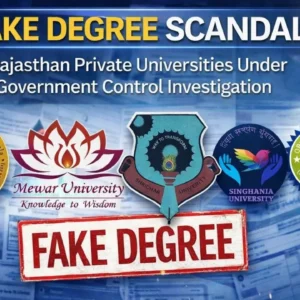Indians Impersonate Bank of America to Dupe U.S. Woman
• ED Busts ₹11.5 Cr Bank of America Fraud
• Indian Call Centre Scam Targets U.S. Woman
• ED Seizes Assets, Crypto Trail Probed
Unmesh Gujarathi
Sprouts News Exclusive
Contact: +91 9322755098
Sprouts News Exclusive
Contact: +91 9322755098
The ED has busted a ₹11.54 crore cyber fraud run from Punjab, where Indian scammers posed as Bank of America officials to dupe a U.S. woman. The gang accessed her computer, siphoned funds, laundered money via crypto, and invested in properties. Raids led to frozen accounts, seized assets, and digital evidence.
ED Cracks International Cyber Fraud Ring Based in Punjab
In a major breakthrough against cross-border cybercrime, the Enforcement Directorate (ED) has exposed a ₹11.54 crore fraud and money laundering racket masterminded by Indian nationals. Operating from Zirakpur and Mohali in Punjab, the accused posed as Bank of America officials to defraud a U.S.-based woman by gaining remote access to her computer system.
The Chandigarh Zonal Office of the ED executed search operations at four premises on July 29, 2025, under the Prevention of Money Laundering Act (PMLA), 2002. Key accused Vikramjeet Singh, Anchal Mittal, and Akshay Mittal were found operating a fake call centre that impersonated U.S. banking personnel, specifically targeting foreign nationals through deceptive telecommunication and remote access software.
Click Here To Download the News Attachment
Contents
- Indians Impersonate Bank of America to Dupe U.S. Woman
- • ED Busts ₹11.5 Cr Bank of America Fraud
- • Indian Call Centre Scam Targets U.S. Woman
- • ED Seizes Assets, Crypto Trail Probed
- ED Cracks International Cyber Fraud Ring Based in Punjab
- Modus Operandi: Bank Impersonation, Remote Access & Crypto Routing
- Seizures & Evidence: Crypto Assets, Real Estate, and Shell Accounts
- During the ED raids, the following assets and evidence were recovered:
- In an official statement, the ED confirmed:
- Global Impact: Targeting U.S. Citizens via Indian Call Centres
- ED Expands Probe: Crypto Links, Offshore Accounts Under Scanner
- Rise in Tech-Driven Fraud: Policy Alarm for Regulators
- ED’s Action a Wake-Up Call for Digital Regulation
Modus Operandi: Bank Impersonation, Remote Access & Crypto Routing
According to the ED’s preliminary findings, the gang contacted Merle Lee Korejwo, a senior citizen in the United States, and falsely introduced themselves as officials from Bank of America. Under the guise of a routine banking check, they acquired illegal remote access to her computer and transferred over $1.38 million (approx. ₹11.54 crore) from her accounts.
The Proceeds of Crime (POC) were quickly funneled through more than 100 bank accounts across India. A significant portion of the siphoned funds was converted into cryptocurrency, with the rest invested in immovable properties, indicating a classic money laundering structure designed to layer and disguise the illicit source of funds.
The Sprouts News Investigation Team (SIT) learned from sources that the accused operated via VoIP services and used VPNs to mask their identities, imitating genuine U.S. call centre operations with convincing digital frontends.
Seizures & Evidence: Crypto Assets, Real Estate, and Shell Accounts
During the ED raids, the following assets and evidence were recovered:
•₹50 lakh across multiple bank accounts was immediately frozen.
•Three immovable properties worth over ₹1.5 crore were traced and linked to the scam proceeds.
•Digital forensics evidence, including cloned emails, remote desktop access tools, and falsified identity documents, were seized from the operation sites.
•Crypto wallet addresses and transaction logs are under forensic examination to determine the digital laundering chain.
In an official statement, the ED confirmed:
“Various incriminating documents, digital evidence and account details were recovered during the searches. Immovable properties linked to the accused, and funds routed via crypto transactions, point to a highly coordinated laundering setup.”
Global Impact: Targeting U.S. Citizens via Indian Call Centres
ED officials believe the group is part of a larger syndicate exploiting vulnerable individuals—primarily elderly residents in the U.S.—through phishing calls, tech-support scams, and fake banking alerts.
The Sprouts News Investigation Team (SIT) has tracked similar complaints in the U.S., where victims were coerced into granting screen-sharing access or downloading malicious software, allowing full control over their finances.
The increasing use of cryptocurrencies by such fraud networks has emerged as a regulatory blind spot. As the digital footprint becomes more obscure, law enforcement agencies face significant hurdles in tracing, freezing, and recovering funds across jurisdictions.
ED Expands Probe: Crypto Links, Offshore Accounts Under Scanner
The Enforcement Directorate is now widening its investigation to track:
•The crypto exchanges and wallets used to convert stolen money
•International wire transfers linked to shell companies or offshore accounts
•Any foreign collaborators or enablers who may have facilitated the fund routing
•Potential links to similar scams targeting citizens in Canada, Australia, and the UK
The Sprouts News Investigation Team (SIT) has learned that Interpol assistance may be sought to assess cross-border implications and identify possible global co-conspirators.
Also Read: Bank Maharashtra Illegal SARFAESI Claim Sparks Public Outrage.
Rise in Tech-Driven Fraud: Policy Alarm for Regulators
This case is part of a growing pattern of tech-driven international scams originating from India, especially Punjab, Delhi NCR, and Gujarat, where fraudulent call centres use AI-powered scripts, spoofed numbers, and fake dashboards to mimic legitimate institutions.
Experts suggest that urgent policy coordination is needed between:
•RBI, ED, FIU (India), and
•Global financial intelligence units like FinCEN (U.S.) and FATF,
to clamp down on crypto-enabled laundering and tech-driven impersonation frauds.
ED’s Action a Wake-Up Call for Digital Regulation
The ED’s swift action in busting this ₹11.5 crore cyber laundering racket sets a strong precedent for tackling transnational white-collar crime. However, it also reveals significant gaps in cyber policing, crypto regulation, and cross-border financial intelligence coordination.
As India pushes forward with its Digital India mission, cases like this underline the urgent need for stronger cybersecurity infrastructure, international cooperation, and proactive enforcement.



















